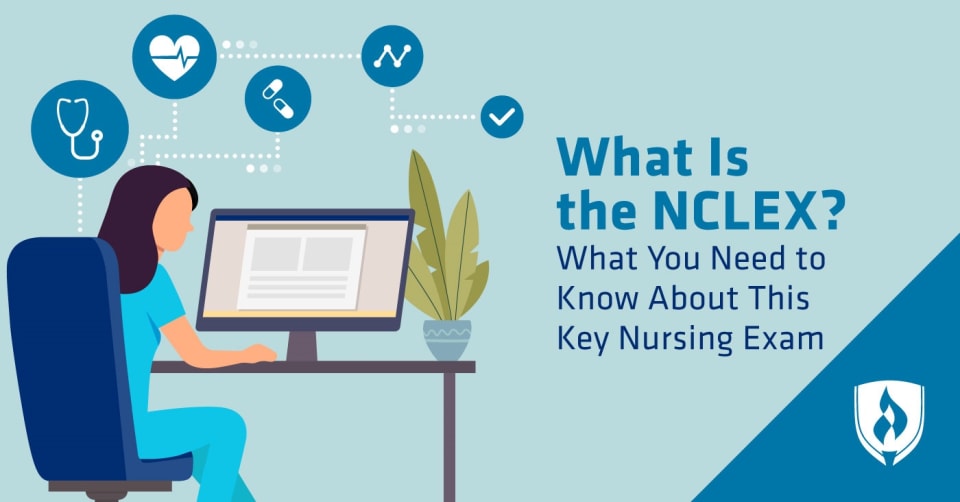What Is the NCLEX? What You Need to Know About This Key Nursing Exam
By Kirsten Slyter on 10/26/2020

You’ve always enjoyed caring for people and making a difference in others’ lives. Your friends and family can attest that you’re a quick thinker while being simultaneously empathetic, so they weren’t surprised when you mentioned your interest in pursuing a nursing career.
You probably already know that there’s a fair amount of schooling and clinical experience standing between you and your potential future career as a nurse. But what you may not know is that graduation isn’t actually the final step. There is one more item to check off your list before landing your dream nursing job—obtaining a license to practice nursing in your state.
If you’ve started researching the process for obtaining nursing licensure, you’ve likely seen plenty of fairly straightforward requirements like background checks and application fees. But there’s also a requirement you might not know as much about—the NCLEX®.
But what exactly is the NCLEX? Simply put, it is a licensure test used to prove a would-be nurse’s competence. But that’s just scratching the surface. Keep reading as we tackle some of the biggest questions students have regarding this important exam.
Get Your Nursing School Questions Answered at a Nursing Information Session
What is the NCLEX?
NCLEX, which stands for National Council Licensure Examination, refers generally to one of the two standardized tests nurses need to pass in order to become either a licensed practical nurse (LPN) or a registered nurse (RN).
In order to become licensed, nursing hopefuls must have an approved nursing degree and pass either the NCLEX-RN® (for RNs) or NCLEX-PN® (for LPNs). This step is important as it provides states with a way to independently verify your nursing knowledge and gauge your ability to safely practice as a nurse. Think of it this way—would you want to be treated by a nurse who hasn’t proven they’ve met these standards? Probably not!
Who has to take the NCLEX?
The short answer is basically anyone who wants to work as a nurse will be required to take and pass the NCLEX exam. As we mentioned earlier, there are two distinct forms of the NCLEX exam based on education level.
Those who hold a Practical Nursing diploma in the hopes of becoming a licensed practical nurse (LPN) must pass the NCLEX-PN. Associate’s or Bachelor’s degree holders who wish to become a registered nurse (RN) must pass the NCLEX-RN.
Comparing NCLEX-PN vs. NCLEX-RN
What are the true differences between the NCLEX-PN and the NCLEX-RN exam? When it comes to the overall format, there are more similarities than differences. Though there are slight differences in the number of questions and the time limit on the exams, most of the difference is centered around the content of those questions.
Though LPNs and RNs both provide care for patients, RNs have an increased scope of practice and the NCLEX-RN questions reflect that. Since registered nurses can oversee LPNs, the NCLEX-RN contains more questions on managing others while the NCLEX-PN focuses on coordinating care between health professionals. RNs can also manage total parenteral nutrition and the administration of blood and blood products to patients so questions on both topics are included on the NCLEX-RN.
Though the tests cover different material, they both provide a rigorous assessment of a nurse’s key competencies for practicing at their credential level.
What types of questions are included on the NCLEX?
“NCLEX questions are written at the application or higher levels of cognitive ability to test the candidate’s complex thought processing,” says registered nurse and NCLEX success coach Kelly Beischel. “The questions can be multiple choice, fill-in-the-blank, hot-spot items, multiple response items and ordered response items.”
On any given question, there may be more than one right answer. But choosing the “most correct” answer for the given scenario will show that you’ll be able to think critically and make efficient decisions when you’re practicing as a nurse.
“The NCLEX makes you think [through] each situation presented,” explains RN Esfira Shakhmurova. “It confuses the reader by giving four or five different scenarios, but as a nurse you must do what's in your scope of practice and prioritize your care. There are questions that are like curve balls, but you’re only able to answer what the question is asking you.” Shakhmurova recommends taking each question bit by bit in order to understand what is being asked, as well as the initial care you should provide for the patient.
Other questions on the NCLEX require the typical basic memorization and knowledge of facts you’d find on any test, so you’ll need to dedicate a significant amount of time to studying and memorizing important nursing concepts as well. Read more about passing the NCLEX on the first try.
How do you sign up for the NCLEX?
In order to take the NCLEX, you’ll first need to apply for a nursing license from your state board of nursing. If they determine that you meet the criteria for exam eligibility, you’ll then register to take the exam. Shortly after, you’ll receive an NCLEX Examination Candidate Bulletin in the mail, which includes an Authorization to Take the Test (ATT), a list of testing centers and instructions on how to register to take the test.
How is the NCLEX administered?
Once you get to the test center on the day of your exam, you’ll need to present a valid form of identification, read and sign paperwork, store personal belongings and proceed to the testing room. Here you’ll have up to six hours to complete the exam. If that seems like an inordinately long amount of time for a test, you can rest assured knowing that you’ll have ample time to think through each question. There are at least two predetermined breaks offered during the exam.
The NCLEX exams are administered by using a testing method known as computerized adaptive testing (CAT). This means that each time you answer a question, the computer will re-estimate your nursing ability based on your answers and the difficulty of the questions. This system is designed to serve up questions that, according to your previous answers, are difficult enough to give you a 50 percent chance of answering correctly.
This testing format also means that the duration of the test can vary from candidate to candidate. If you’re on the edge of a passing score, you’ll continue to receive questions until you either run out of time or meet a confidence threshold by answering enough questions correctly.
While this might seem complicated, there are good reasons for this format. For one, a high-ability candidate passing based solely on their ability to answer the “easy” questions correctly isn’t a great reflection of their ability to work in a real setting. Additionally, providing a series of high-difficulty questions to a marginal candidate often leads to the candidate guessing. A correct series of guesses leading to a passing result is not ideal, either. This responsive format helps develop a better gauge of a nurses’ overall competence.
How can I prepare for the NCLEX?
Feeling confident and prepared for the NCLEX is important, so knowing how to study properly for the exam is essential. First things first: Don’t cram at the last minute. Put in the proper time, study the exam itself and how it works and make sure to take lots of practice tests.
It can also be helpful to get together with other nursing students in your program and hold study sessions. The NCLEX can be challenging, but working together with a group of like-minded individuals can be motivational and remind you why you decided to become a nurse in the first place.
It’s time to jump in
If the NCLEX sounds intimidating, keep in mind that you’ll be more prepared on the other side of nursing school than you are right now. If becoming a nurse is your end goal, the NCLEX will simply be another hurdle you’ll need to clear before crossing the finish line. With the right preparation and education, you’ll be feeling confident in your ability to pass with flying colors.
Now you know what the NCLEX is and what to expect from the exam. But before you can set your sights on conquering the test, you must first make it through nursing school. Learn more about the next steps in our article: Your Step-by-Step Guide to Getting Into Nursing School.
NCLEX, NCLEX-RN and NCLEX-PN are registered trademarks of National Council of State Boards of Nursing, Inc




